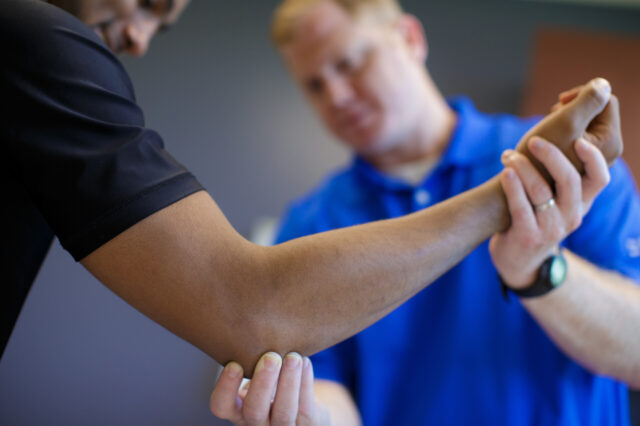National Athletic Training Month Q&A

March is National Athletic Training Month, and we caught up with Jason Vereb, M.S., A.T.C., L.A.T., who joined the University of Florida in 2019 and works as an athletic trainer at the UF Health Orthopaedics and Sports Medicine Institute as well as the supervising athletic trainer at Santa Fe College. Read his thoughts on all things athletic training below:
What does being an athletic trainer mean to you? Being an athletic trainer means that you speak for the athlete. You are there to protect them and to provide them guidance in orthopaedic and other various medical issues. An athletic trainer acts as a gatekeeper because they have to figure out where to send the athlete, whether it’s orthopaedics, general practitioners, even nutritionists at certain levels. An athletic trainer wears a lot of different hats, but they are also there as someone the athletes can talk to. I let them know that they are more than an injury, they are a person. If they need to talk, I’m willing to talk to them and help them out the best I can.
Walk me through a typical day. Since I work in outreach, there will be several days a week that I will be in the clinic, helping the physicians. I perform an initial exam on a patient and prep the doctor for what they will be walking into. When my clinic responsibilities are over in the morning, I head to Santa Fe College five days a week. There I supervise a doctoral athletic training student. Together we manage game and practice coverage, as well as injury rehabilitations. With the climate we are in right now, COVID-19 presents its challenges. I’ve taken on a big role with managing COVID-19 issues at Santa Fe. We implemented a testing program this semester involving rigid protocols, including setting up physician visits and facilitating EKGs, if necessary. COVID-19 adds a lot more than what I expected when I first took the job in December 2019. It has changed what I thought I would be doing quite a bit.
What is the most frequent injury you see at UF Health? With the doctors that I work with, I see mostly arthritis, knee osteoarthritis and shoulder arthritis, but there are also ACL and ligament injuries. Other injuries like ankle sprains, knee sprains, shoulder tendinitis and other overuse injuries are common. Once in a while you get the uncommon things, but for the most part it is typical athletic injuries.
How do you motivate athletes who are in recovery from an injury? In the college setting for the most part, the athletes are usually self-motivated because they are here to play sports and they want to get back to doing so. Other than that, on a day-to-day basis to motivate them, I show them the progress they have made. It’s little things like that. If you just take the time to get to know them a little bit more personally, they trust you and then you don’t have to outwardly motivate them. They understand you are coming from a supportive place.
The UF College of Medicine’s department of orthopaedics and rehabilitation offers an adolescent and high school sports athletic training outreach program in the local area. Can you tell us more about the program? The athletic training outreach program covers any school in Alachua County, Levy County, Gilchrist County and Columbia County. The schools are staffed by either an athletic training graduate assistant or a doctoral student. Each supervisor has three schools and goes to the schools at least once a week to work with the head athletic trainer at that school and ask them what they need. Then we facilitate that, like getting an athlete to see an orthopaedic doctor and sharing ideas for certain rehabilitations. We are growing the next generation of athletic trainers as we are preparing them for their first job. As far as the department goes, the support from the orthopaedic physicians is amazing. The physicians are accessible and available at almost all points in time. We have direct contact with them so we can facilitate scheduling athletes’ visits. The program provides first level care. This access to physicians and resources doesn’t happen everywhere.
About the author
